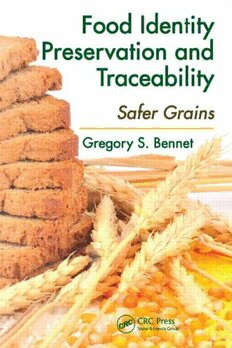Download Food Identity Preservation and Traceability: Safer Grains PDF Free - Full Version
Download Food Identity Preservation and Traceability: Safer Grains by Gregory S. Bennet in PDF format completely FREE. No registration required, no payment needed. Get instant access to this valuable resource on PDFdrive.to!
About Food Identity Preservation and Traceability: Safer Grains
A Practical Roadmap to IPT Integration From baby formula and peanut butter, to E. coli-tainted peppers and salmonella-tainted pistachios, no food product or means of its production is immune to risks. And while these risks may never be fully eliminated, identity preservation and traceability (IPT) systems make it easier to determine the source and extent of contamination, thereby reducing the often deadly consequences. With a core emphasis on grain, this encyclopedic reference documents the state-of-the-science throughout the entire food chain in both domestic and international markets as it relates to food safety and economics. The book provides a cohesive introduction to IPT systems and summarizes the programs currently available, in effect developing a conceptual model of IPT at the producer level. Addresses the History, Theory, and Design Components Beginning with an informative history of IPT, the book continues with examples of IPT programs and standards of official seed organizations. It then provides a sampling of government, industry, and company approaches toward IPT systems throughout the past two decades. For ease of use as a reference, most chapters begin with a brief description of the essentials necessary to understand the chapter’s contents allowing readers to jump right in, rather than having to read chapters in sequential order. Providing an in-depth understanding of the complexity of IPT systems, the rules they function under, and how they are shaped and modified, this valuable resource effectively demonstrates why IPT is a critical practice for food safety.
Detailed Information
| Author: | Gregory S. Bennet |
|---|---|
| Publication Year: | 2009 |
| ISBN: | 1439804877 |
| Pages: | 681 |
| Language: | English |
| File Size: | 12.453 |
| Format: | |
| Price: | FREE |
Safe & Secure Download - No registration required
Why Choose PDFdrive for Your Free Food Identity Preservation and Traceability: Safer Grains Download?
- 100% Free: No hidden fees or subscriptions required for one book every day.
- No Registration: Immediate access is available without creating accounts for one book every day.
- Safe and Secure: Clean downloads without malware or viruses
- Multiple Formats: PDF, MOBI, Mpub,... optimized for all devices
- Educational Resource: Supporting knowledge sharing and learning
Frequently Asked Questions
Is it really free to download Food Identity Preservation and Traceability: Safer Grains PDF?
Yes, on https://PDFdrive.to you can download Food Identity Preservation and Traceability: Safer Grains by Gregory S. Bennet completely free. We don't require any payment, subscription, or registration to access this PDF file. For 3 books every day.
How can I read Food Identity Preservation and Traceability: Safer Grains on my mobile device?
After downloading Food Identity Preservation and Traceability: Safer Grains PDF, you can open it with any PDF reader app on your phone or tablet. We recommend using Adobe Acrobat Reader, Apple Books, or Google Play Books for the best reading experience.
Is this the full version of Food Identity Preservation and Traceability: Safer Grains?
Yes, this is the complete PDF version of Food Identity Preservation and Traceability: Safer Grains by Gregory S. Bennet. You will be able to read the entire content as in the printed version without missing any pages.
Is it legal to download Food Identity Preservation and Traceability: Safer Grains PDF for free?
https://PDFdrive.to provides links to free educational resources available online. We do not store any files on our servers. Please be aware of copyright laws in your country before downloading.
The materials shared are intended for research, educational, and personal use in accordance with fair use principles.

